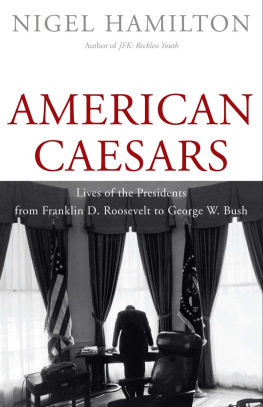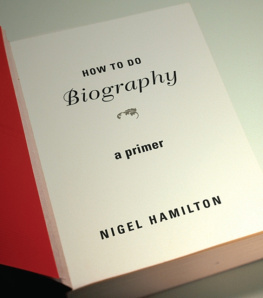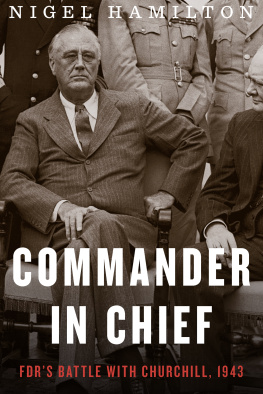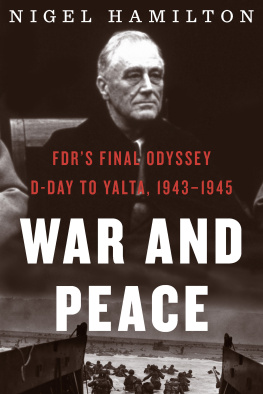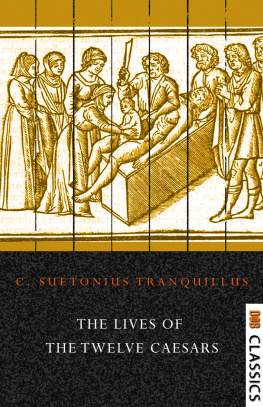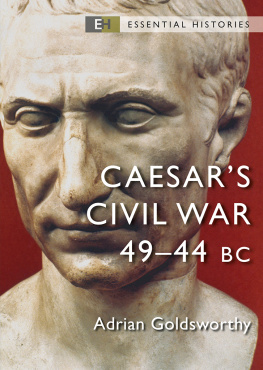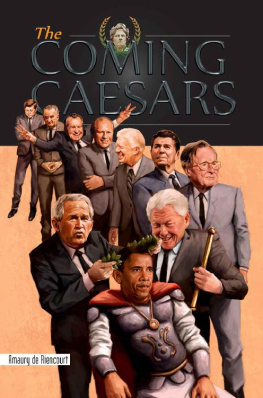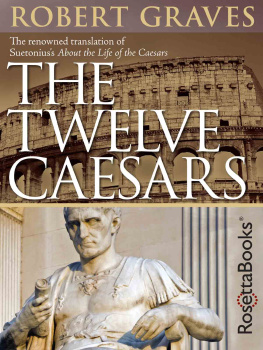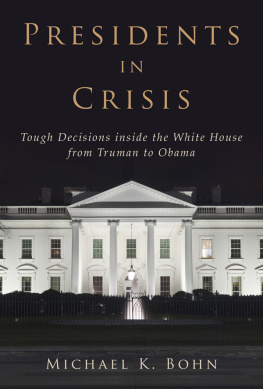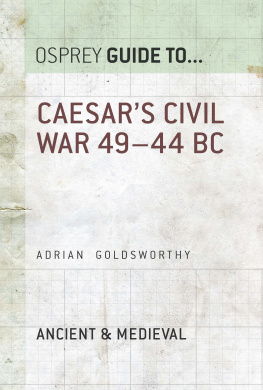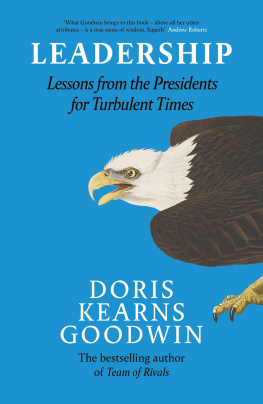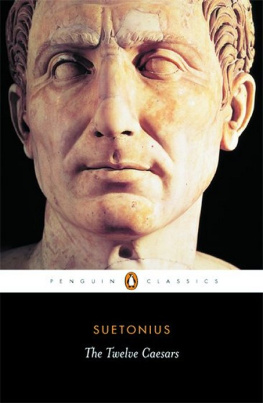Acknowledgements
American Caesars originated in 2007, when I was approached by Dan Hind of The Bodley Head, part of the Random House publishing group in London.
For several years I had taken time out from presidential biography to write two short books on biography Biography: A Brief History, and How To Do Biography: A Primer. However, having spent more than ten years writing multi-volume, large-scale presidential biographies (JFK: Reckless Youth; Bill Clinton: An American Journey; Bill Clinton: Mastering the Presidency), I was actively exploring the idea of a group biography of US presidents I admire in part because I so deprecated the performance of George W. Bush as 43rd President, as I explained in the Prologue to Bill Clinton: Mastering the Presidency.
Dans idea of a book about modern American presidents in the manner of Suetonius The Twelve Caesars a book I have cherished (and quoted) for four decades thus struck me as serendipitous. And intriguing. No author since Suetonius has, after all, emulated his portraits of the first Roman emperors by seeking to look at a succession of such world-historical rulers.
What I particularly liked about the Suetonian approach, when I examined it structurally, was the separation of his lives into first the public career, and only then the personal life, or love-life, of his subjects. I had never used this biographical paradigm, since every modern biographer is de rigeur a disciple of Freud, and must lace a modern understanding of the subjects psychology into the gradual unravelling of the subjects lifestory, from the start, to satisfy public expectation. A trial chapter addressing President Truman, however, demonstrated to me, and to Dan, that by focusing first on the public career of the President, and only then on the life of his heart, so to speak, it was possible to see the politician initially in the context of his historic imperial role, and then, by contrast, as a man with a private life story.
Would that American Caesars had followed such a straightforward trajectory! The number of excellent individual biographies of the presidents, over recent decades, made it unnecessary to seek out unpublished material for the new work but it did pose a substantial challenge of printed digestion. Beyond that, my task became one of selection and design, as Lytton Strachey put it in the preface to his masterpiece Eminent Victorians: using the framework of modern American empire, or hegemony, as the backcloth to the Caesars lives. In this respect, at least, it promised to be less forbidding for me to tackle, perhaps, than for a number of my fellow American historians. Not only because of my detailed previous work on Presidents John F. Kennedy and Bill Clinton (and, earlier, on Dwight D. Eisenhower as a general, when writing my official biography of Field Marshal Montgomery), but because of the years I had spent in Great Britain which made the concept of empire perfectly normal for me. Britain had, after all, established the worlds largest territorial empire in the nineteenth century. In my own lifetime it had then ceded that role as guardian of international order and prosperity to the United States. Nevertheless, the sheer epos political and personal of the presidents lives within the imperial context soon ran away with me. By the time the manuscript was ready, after two years research and writing, it was twice too long.
Dans successor at the Bodley Head, Jrg Hensgen, rightly refused to publish the book en gros indeed felt it to be unpublishable at such length (and digressiveness). There thus began the heartbreaking task of self-editing, or self-mutilation. Only by picturing myself back in the cutting room studios of the BBCs Film and Documentaries Department in the 1980s was I able to overcome my aversion to the sight of so much lexical blood (First Cut, Second Cut, Final Cut). In the end the necessary surgery was completed, however, and I was able to see how wise Jrg had been. The lives of the twelve American Caesars had become shorter, omitting many a crucial event or aspect, but were now significantly more focused in my narrative. And, perhaps most important to me and hopefully the reader the portraits were still moving. To my editor Jrg Hensgen, then, I owe a huge debt of gratitude.
All my writing life I have sought to examine the nature, vagaries and conduct of leadership: literary, military, and political. In large part, I suppose this is due to my late father, who from humble circumstances rose to become a decorated infantry battalion commander in World War II, and later Editor-in-Chief of the London Times and Sunday Times. He had arranged for me to intern at age nineteen on the Washington Post in the summer of 1963 an experience which, though it did not make me a journalist, did make me into a lifelong student of American history and politics, spurred by that great American patriot and editor, Russ Wiggins. Over the years, in researching my military biographies, I gradually learned my way around myriad American archives and in 1988, after my fathers death, I moved to Boston, Massachusetts, to start work on a fresh life of President John F. Kennedy. Save for a stint teaching biography and history in England in the late 1990s, I have been at work in the US ever since, with my intellectual home located in the states diverse and beautifully situated University of Massachusetts Boston, next to the Massachusetts State Archives and Kennedy Library. I want to thank therefore my many colleagues at UMass Boston, especially Professors Paul Bookbinder, Padraig OMalley, William Percy, Robert Weiner, Carter Jefferson and Ed Beard, as well as the Director, Steve Crosby, the staff and all my colleagues in the John W. McCormack Graduate School of Policy Studies. I am particularly grateful to Steve Crosby for help in providing a student research trainee, Lisa Cathcart, who worked diligently and tirelessly to assemble relevant documentation for each chapter, following initial research assistance by Danielle Thompson. Bill Baer and the staff of UMass Healey Library, likewise, were, once again, of invaluable assistance. The directors and archivists of the National Archives John F. Kennedy, Richard M. Nixon, Gerald R. Ford, Jimmy Carter and Ronald Reagan Presidential Libraries were invariably hospitable and helpful on my visits; also my sojourn as a Visiting Scholar at George Washington University and at Georgetown University in 2005 proved immensely helpful especially since, at the latter, my office was located in the Classics Department, where Greek and Roman parallels with modern America were constantly discussed! I am particularly grateful to those members of the Clinton Administration I was able to interview for my Clinton biography, from Rahm Emanuel to Leon Panetta and Larry Summers, but also to the historians of the US Senate, Richard A. Baker and Donald A. Ritchie, as well as distinguished authors belonging to the Washington Writers Group, led by Dan Moldea, for their constant kindnesses and encouragement.
The fact is, no serious historian can write a biography without the help of his or her literary peers. I was fortunate to be alerted by James McGrath Morris, the editor of thebiographerscraft.com, to the existence of the Boston Biographers Group and to them I would like to extend my heartfelt gratitude for moral, emotional and intellectual support during the genesis of this work. To my fellow biographers, authors and professional colleagues Herbert Parmet, Carlo DEste, David Kaiser, Clive Foss, Larry Leamer, David Chanoff, Mark Schneider, Timothy Naftali, Craig Howes, Andrew Phillips, David Sparks, John Gartner, Mel Yoken, and others who read or listened to parts of the manuscript, my deep gratitude. My lifelong friend and classmate from Cambridge University days, Robin Whitby, read each chapter of the original manuscript for readability and general interest, as did my brother Michael Hamilton, following his retirement from Briggs & Stratton, Milwaukee. Audience responses at Suffolk University in Boston, UMass Boston, UMass Dartmouth, Roxbury Latin School and the Cambridge Boat Club to preliminary readings from the evolving manuscript proved greatly encouraging. My wife, Dr Raynel Shepard, ESL Curriculum Developer of the Boston Public Schools, kept me focused and happier than perhaps I have ever been while undertaking a major book project. Bruce Hunter, of David Higham Associates, acted as not only my literary agent but, as always, my stalwart adviser, friend and reassurer-in-chief. I have much to be grateful for and I am, especially for the faith of the Publishing Director of The Bodley Head, Will Sulkin, and his colleagues, in the merit of the project. I can only hope the book, for all its faults, is worthy of so much help and support across two continents.

